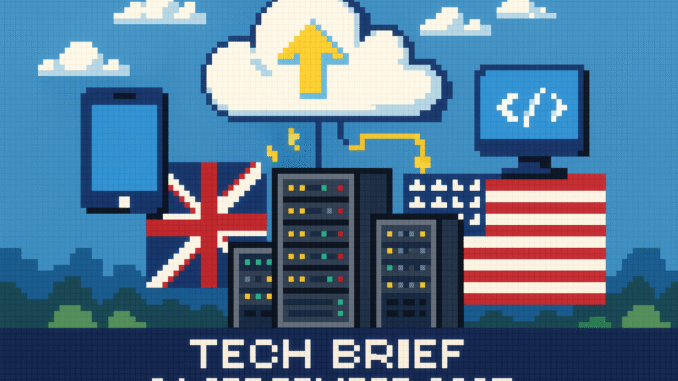
Tech Brief 24 September 2025 arrives with the faint whine of spinning disks and the unmistakable aroma of ozone from a freshly powered CRT. Today’s stories are sorted for anyone who likes their news with a side of circuit diagram. Missed yesterday’s Tech Brief? Catch up here before diving in.
US, UK Strike £250 Billion Tech Accord as Starmer and Trump Ink Mega-Deal
A single handshake in Washington just shifted more tech pounds than the entire British home computing boom ever did. Keir Starmer and Donald Trump have signed a £250 billion Tech Prosperity Deal between the UK and US, featuring Microsoft’s £24 billion cloud investment for the UK, new Nvidia-powered AI infrastructure, and Blackstone spending £90 billion on UK assets over a decade. GSK is investing £30 billion in US-based research.
Is this a rebirth for British tech sovereignty, or is the UK simply hosting server farms for American giants? ARM and Sinclair once led the world from British soil. Now, international capital is moving both ways; however, the real decision-making power seems less local. Somewhere, the ghosts of the BBC Micro team are scribbling notes, weighing the pros and cons.
Amazon Fresh Shuts All UK Stores After Four Years
“The tills are dead, long live the tills.” Amazon is closing all 19 of its UK Amazon Fresh shops, just four years after their much-hyped launch. Five locations will become standard Whole Foods, while the rest will shutter entirely. The till-free, sensor-laden retail experiment fizzled in a country where queuing is a sport, and most people are suspicious of innovation they cannot personally unplug.
Amazon’s big promise was a shop with no human checkout. Most Brits shrugged, muttered “nice try,” and went back to the Co-op. Tech dreams of frictionless shopping rarely survive the British instinct for customer banter or a natter at the self-checkout. Amazon’s retreat shows the limits of importing Silicon Valley “solutions” to British high streets. Policymakers might want to keep that in mind before approving the next shiny pilot.
OpenAI, Oracle, SoftBank Reveal Plans for $500 Billion Stargate Data Centres
OpenAI and its partners are planning five enormous data centres called Stargate, designed to support the next generation of AI systems. At a projected cost of $500 billion, these facilities will redefine what “infrastructure” means for the internet era. With Nvidia GPUs humming in bulk, the project sounds futuristic; however, power and cooling remain major headaches.
How many users will actually benefit? The scale dwarfs even the 1990s fibre and modem expansion. Environmental impact, energy use, and the concentration of data control in private hands are all real concerns. Editorial confession: I once spent an afternoon coaxing a BBC Micro to print a class schedule. These numbers are both awe-inspiring and, frankly, a bit exhausting.
Connected Britain Opens: Industry Leaders Set Vision for Universal Internet
Over 8,000 telecom professionals, policymakers, and tech suppliers are gathering at ExCeL for Connected Britain. The event spotlights gigabit broadband, 5G and 6G rollout, “altnets” challenging legacy networks, and digital inclusion. Sir Chris Bryant MP and Natalie Black CBE are among the speakers steering conversations about building strong, secure British networks.
The theme is infrastructure as destiny. If cloud deals and mega data centres are shaping tomorrow, Connected Britain is where the wires meet the wall. Rural rollout, security, and open standards are practical concerns that echo the earlier stories about cloud expansion and data control. Everyone from Openreach to NVIDIA has a stake, and nobody wants to be left buffering at the digital roadside.
From the Wayback Machine
On This Day: 1981 – BBC Micro first shown to teachers and press at a London hotel, promising to “ignite a new era in classroom computing.” Its injection-moulded keys and 16K of memory captured the imagination of a generation. Forty-four years later, that same blend of British ambition and pragmatism still pulses in debates about digital literacy and inclusion.
What This Means
Is Tech Brief 24 September 2025 about progress, retreat, or just another version of familiar ambition? From mega-deals to failed retail tech, every headline hints at a national urge to invent and reinvent. Maybe our strongest tradition is quietly questioning what future we want to build.
Keep your soldering iron cool and your bookmarks organised. The story always continues, sometimes right under your feet.
Missed yesterday’s Tech Brief? Catch up here

Leave a Reply